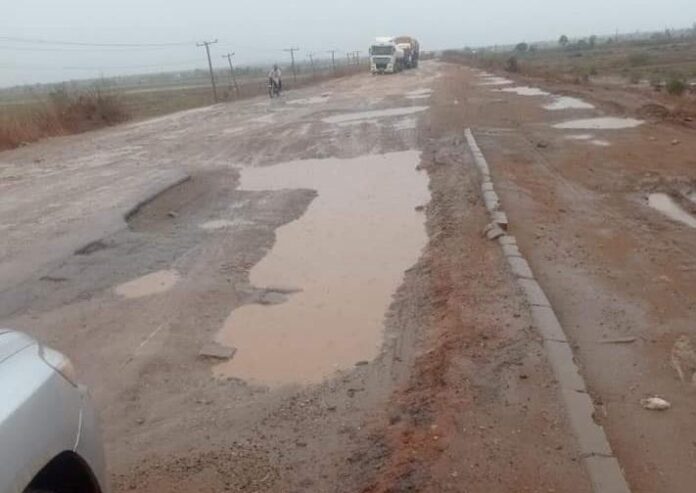Why Bida-Lambata Road Needs Quick Attention? By Nuhu Mohammed
POLITICS DIGEST – Infrastructural development gives the country hope for sustainable development and a peaceful environment.
Nigeria is a developing nation there is a constant demand for good quality infrastructure, transportation, and services. But since Nigeria is a huge country with quite a sizable population, this problem still has not been addressed in totality.
But one of the striking underlying facts is the condition of the roads, around 50 percent of the country’s population lacked access to all-weather roads. Since roads, directly and indirectly, contribute to the economic growth of the country.
And Niger State as one with the highest landmass suffers bad roads, as a gateway between the Southwestern part of Nigeria to the Northern part of Nigeria is not counted out as the result of bad roads. The Bida-Lapai-Lambata road was awarded in 2017 and which later integrated into NNPC credit schemes. Since then work is going on between Lambata to Lapai. However, Lapai to Bida is unbearable and sorry conditions. If the road finally collapsed all the economies of the areas will be frustrated particularly that of the southwest to North axis will record down steps in trading. All the Baddegi bridges are on the verge of damage.
For the communities and people of Niger South, these problems faced by the roads are; bad riding quality, poor geometrics, and insufficient pavement thickness. Having a poor road system makes it more difficult for children to go to school and more expensive for farmers to bring their produce to the market. Bad roads adversely affect people in countless other ways and thus makes people poorer. Building and repairing roads make a powerful impact on people’s lives in rural areas. Many small towns are poor, and young people are being driven to go to large cities to find jobs. It is vividly gathered by the Nupe Center that billions of naira lose as a result of the untold condition of the road.
Additionally, development brings social, cultural, and economic changes in the lives of the people in terms of providing connectivity between people and places and thus helps in reducing the poverty as long as direct market access to the rural producers. It is a fact that if roads in an area are well-developed and properly maintained, travel time is reduced and access to local markets, workplaces, educational institutions, and medical and health services is increased.
Read Also:
Why Bida -Lapai road needs quick attention is to benefit the community and Nigeria at-large as the economies are in crises biting everybody. Nupe Center points out that the benefits of improved road connectivity, are the following:
Health insurance -safe, paved roads that can be used in all weather conditions mean that people who once suffered at home, or died in transit, can now reach modern medical care, and women would have better access to pre-natal and post-natal health care. Also, other facilities like access to education would enhance the social status of women. Health workers will also be able to achieve a 100% immunization rate in many villages so that they can be reached and lives will be saved.
The improved road enabled people, particularly youth, to find jobs, and commute to work and schools. An improvement in the employment situation in terms of more job opportunities, avenues for self-employment, and so on will be generated.
It also encourages farmers to grow higher-value crops and enabled them to transport their products faster, keeping them fresh and in good condition. And also, Farmers in the area usually make more visits to the market after the new roads.
The number of visits usually made by government agricultural extension workers to farming communities is increased and bringing much-needed expertise and other help to farmers.
More people will be going to nearby towns and villages for odd jobs like selling, vegetables, dairy products, and locally made items like pickles, papad, and so on, which in turn will generate employment opportunities.
Also, the cottage industries, handicrafts, and agro-industry will flourish from improved road connectivity.
Therefore, good road connectivity will result in increased school enrolment and school attendance, especially, in the number of girls/boys going. Parents will be more confident about sending their daughters to schools unescorted.
People will have wider options in buying and selling their commodities. And, small and petty village traders may tap the bigger markets, transport the agriculture products/crops fast, and get more profit margins instead of depending solely on local markets and the middleman.
Good road connectivity not only links the village communities to better markets but also opens up wider work opportunities in distant places.
Improved road connectivity will give an impetus to the growth of tourism;
Better road connectivity will increase sources of income and increased income will help in reducing debts and would increase the buying power of the people, thus would improve overall standards of living.
Good road connectivity will get boost better livelihood options in terms of land price, an increase in business opportunities, changes in people’s lifestyle, shifting of occupation from farming to business, an increase in mobility, good transport, and travel facilities, good accessibility, reduction in poverty, illiteracy and ignorance.
Finally, it is concluded that the effectiveness and impact of the road building projects that connect poor, vulnerable, and isolated communities to schools, services, and markets are key to socioeconomic development. Also, road building and repairing roads make a powerful impact on people’s lives in rural areas. It is imperative to understand that infrastructure such as better roads carries a profound role in reducing poverty.
Moreover, government and relevant stakeholders are called to look at the condition of the road, for quick attention for people to benefit from the uses.
Nuhu Mohammed
Nupe Center, Bida Niger State

















